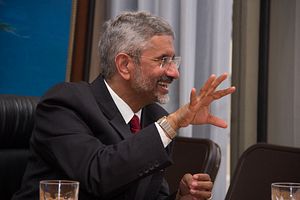As the dust settled on India’s electoral battlefield on May 23, and it has become clear that the incumbent Bharatiya Janata Party scored an even greater victory than 5 years ago, it was obvious that Prime Minister Narendra Modi would continue on for a second term. The indefatigable Modi lost no time in appointing a new cabinet.
Of the 58 members of the government sworn in on May 30, there were not many surprises. There were also a few choices that may turn out to controversial due to the radicalism of the appointed politicians. But on the other hand there is at least one selection that may be read as completely apolitical and is being praised across the board: Subrahmanyam Jaishankar has become India’s new minister of external affairs. This choice is wise and significant for a few reasons.
Firstly, Jaishankar is the first-ever bureaucrat to be given this key post in the Indian government. Jaishankar is a career diplomat, not a politician. He served under various governments, including those of parties rival to the currently ruling BJP. During the 2015-2018 years, he was India’s foreign secretary, the highest-placed bureaucrat in the Ministry of External Affairs. As rightly pointed out by Kanchan Gupta for the Observer Research Foundation, Jaishankar is actually the second foreign secretary in Indian history to become the minister of external affairs, the first one being Natwar Singh (in cabinet 2004 to 2005). Natwar Singh’s case is different, however, Gupta observes, as he had been the secretary much earlier and subsequently went through a political career to reach the minister’s post.
Both in India as everywhere else cabinet positions are nearly always occupied by politicians, especially when it comes to key postings, such as finance, defense, home, or foreign affairs. During the last five years, New Delhi’s foreign ministry was headed by Sushma Swaraj, a politician of the ruling party. It seems that outside the circle of decision-makers, nobody expected Jaishankar to be given this post, up until we saw him in the front rows during the swearing-in ceremony. Not only has Modi chosen policy over politics in this case here – no member of his party would be as well-prepared for this particular job as Jaishankar – but made a meritocratic choice exceptional by even global standards.
Secondly, Jaishankar has a reputation as a tough negotiator – or at least is surely a very experienced one. He played an important role in the negotiations that led to the signing of the U.S.–India Civil Nuclear Agreement in 2005, an event that, with hindsight, was a turning point in the relations between the two countries. Such experience is bound to come in handy as New Delhi is facing a range of challenging, outstanding issues with its relations with Washington (not to speak of other fronts): the India-U.S. trade disputes, the issue of New Delhi’s purchase of the Russian S-400 system, and India’s (currently halted) purchases of oil from Iran, among others.
Thirdly, the choice confirms Modi’s grip over the government and his own party. It is but natural that after the electoral victory all first-tier politicians of the party flock behind the supreme leader in hope of getting powerful posts. As some of these have vast electorates and party coteries behind them, compromises and tough choices must be made, and the cake must be cut into satisfying pieces. The weaker the central leadership of the party is, the more this is apparent.
But in Modi’s case it is clear that although he and his closest aide – the party president, Amit Shah – are incomparably powerful and, while he must make such compromises as well, his hands are much more free in personal selections. Five years ago Modi chose Arun Jaitley to be the finance minister, despite the fact that Jaitley lost the election in his constituency. Jaitley has been Modi’s trusted ally for many years (there was a time where Modi had remained aloof from the central party leadership and Jaitley was his only contact line). Thus the prime minister pushed through a nomination based on his personal choice, not on the inner power structure of the party. This time, in 2019, Modi has appointed an outsider, Jaishankar, to a post that many party leaders would be certainly happy to obtain. In shorter and simpler words: if Modi believes Jaishankar to be the right person, the party needs to yield, and the new foreign minister’s power to act will not be curtailed in any way as long as he has Modi behind him.
And yet in an area so complex and vast the importance of one person should not be overemphasized. The fact of choosing a professional and knowledgeable bureaucrat by itself cannot raise India’s foreign policy to another level, neither can this be an expectation hurled at Jaishankar. His actions will be obviously limited by the general policies of Modi’s government and by India’s limited resources and options on the international stage. Neither it is certain that he must be a minister for a full tenure (Modi has made quite wide cabinet reshuffles in the past).
Fourthly and most importantly, the choice suggests that New Delhi rightly perceives the growing U.S.-China rivalry as one of the most important aspects of contemporary global power dynamics. India will be forced to continuously position itself with regards to this process. Jaishankar has been India’s ambassador to both Beijing and Washington and hence has the right experience to shape New Delhi’s approach towards not only both of them, but towards the consequences of their current relations. The new minister’s general opinion on this is also well-known. At the beginning of this year, during the Raisina Dialogue in New Delhi, upon hearing the comment of a former U.S. General David Petraeus that India “has to decide, has to take a side in the new world order shaped by rising China [and] resurgent Russia,” S. Jaishankar famously replied that India indeed must take a side – its own one.

































